Bart Barber defied the Conservative Resurgence. How it is now shaping his SBC leadership.
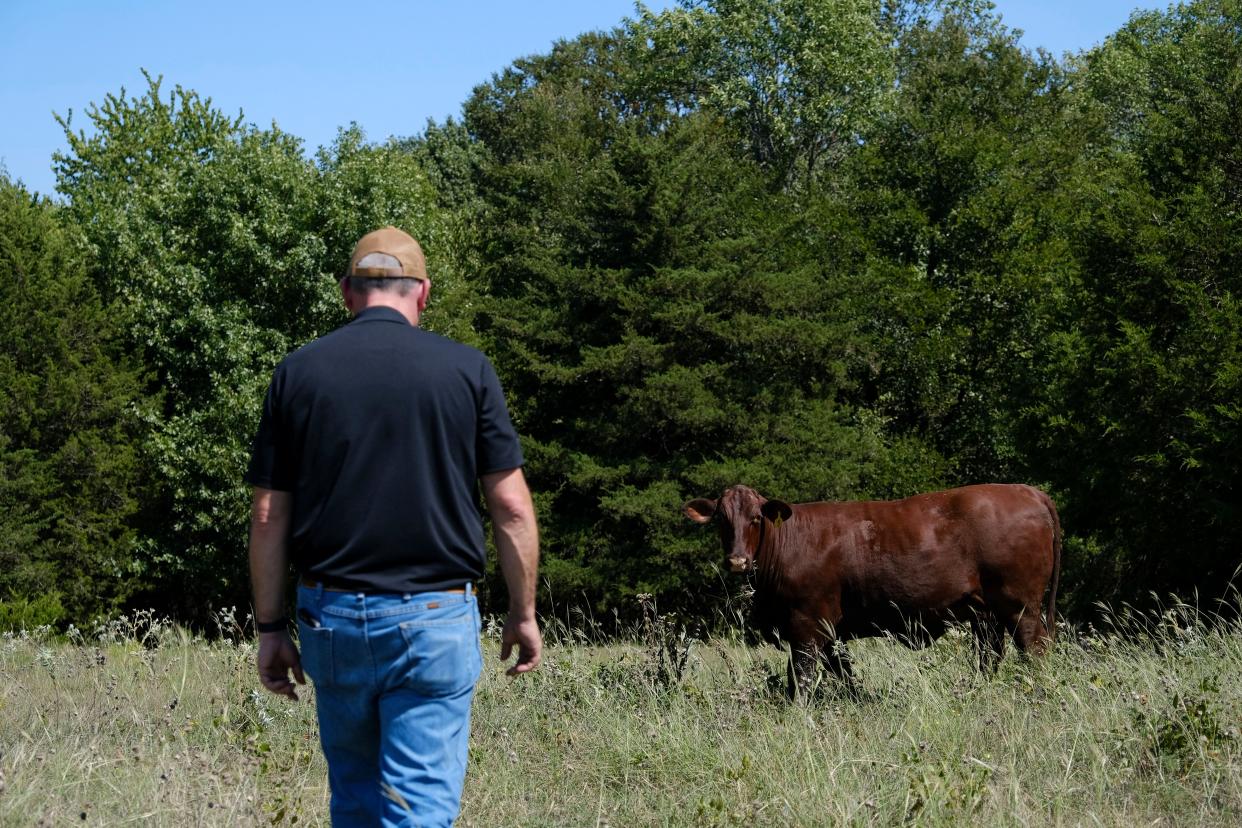
- Oops!Something went wrong.Please try again later.
Bart Barber defied the top brass.
In May 2018, the Texas pastor and his fellow trustees at Southwestern Baptist Theological Seminary in Fort Worth fired seminary president Paige Patterson, the architect of the fundamentalist takeover of the Southern Baptist Convention. Following years of financial-related controversies, revelations about Patterson mishandling reports of sexual abuse pushed Southwestern’s board past a point of no return.
Barber, once a loyal foot soldier in Patterson’s movement, was a decisive vote in Patterson’s dismissal, thereby severing his allegiance. Two weeks later, Barber divulged the details of his defection before thousands at the 2018 SBC annual meeting in Dallas.
“After that, it felt to me that I had become the hero of 10,000 people I didn’t know, while 1,000 people I spent the last 10 years with wouldn’t talk to me,” Barber said in a recent interview.
The break with Patterson is among the central moments that have shaped Barber into the leader he is today within the nation’s largest Protestant denomination. Other moments range from his unexpected decision to run for SBC president to his election victory at the 2022 SBC annual meeting and his reelection this year just two days after his mother died.
But those events in 2018 were the first major turning points.
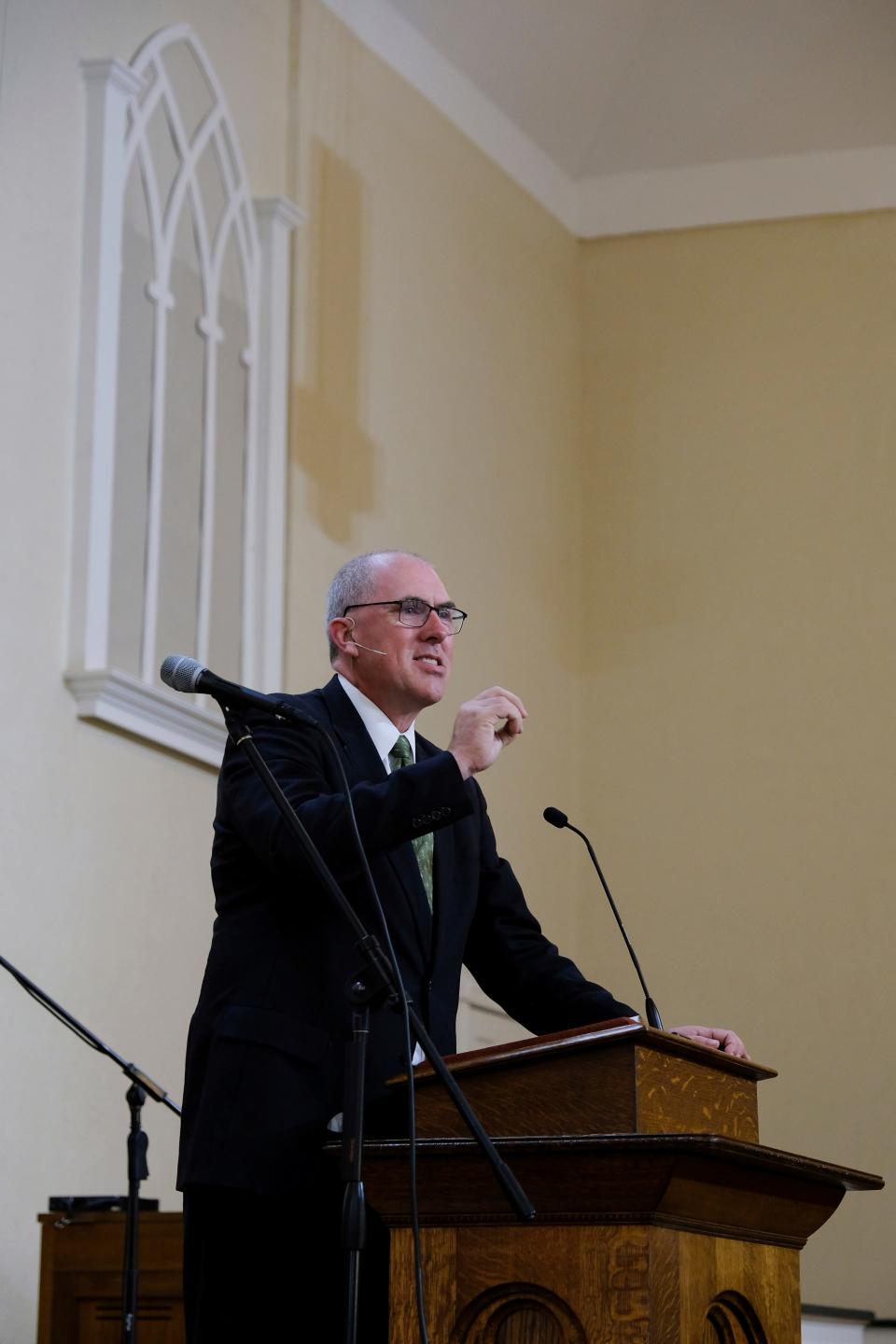
Many Southern Baptist delegates, called messengers, were emboldened by Barber’s five-minute speech during the 2018 SBC annual meeting and responded with a standing ovation. Others who supported Patterson were infuriated and some confronted Barber and his family in the lobby of the convention center.
Barber’s son, who was 15 at the time, stepped in front to defend his dad, mom, and younger sister. Barber gently pulled his son back.
“I said, ‘It’s okay son, we’re getting out of here,’” Barber said in a recent interview, tearing up as he recalled his son's courage. “And we left that meeting and didn’t come back.”
Today, Barber is best known for his folksy friendliness and a geeky love of Baptist history. He’s a small-town pastor and farmer on the side, who posts popular Twitter videos from his ranch where viewers get to meet his cows (with punny names such as Bully Graham) and he pontificates on SBC parliamentary procedures.
Bonus Bully Graham and Lottie Moooon footage at the end. pic.twitter.com/pn62RQBg65
— Bart Barber (@bartbarber) November 3, 2022
But behind that cheery persona is a story of the battles that Barber waged with people who fanned the flames of factionalism and covered up clergy sexual abuse. It contributed to the mess that Barber is now trying to clean up as SBC president.
Along with regret Barber feels about his past actions and the allegiances he held, he also sees learned lessons about what went wrong and how he could take a different approach.
“Bart went against that political juggernaut. He was within it and then he stood against it,” said Southwestern professor Malcom Yarnell, who’s known Barber for 20-plus years. “The only way that’s explicable is he jettisoned personal loyalty because of his sense of loyalty to Jesus Christ and to his church.”
First responsible for leading business at the convention’s two-day annual meeting, the SBC president is one of the most public faces for the Nashville-based denomination. Barber has had additional responsibilities that revolve around several task forces, one that’s implementing abuse reform and another looking at the denomination’s standards for affiliating with churches. The latter group is a response to a debate about churches with women pastors.
The SBC Executive Committee is gathering in Nashville this week and is expected to discuss business related to those task forces.
The combination of scandals, division over issues like abuse reform and women pastors, and declining church membership has fueled an identity crisis in the SBC. Many are wrestling with the question about the denomination’s ability to maintain conservative ideals without being overly exclusionary.
Barber doesn’t have all the answers, but he knows what it’s like to readjust expectations when old models fail.
“You’re not going to fool this man. He has seen things he wished he had not seen,” Yarnell said. “He knows what a real crisis is as opposed to a bump in the road. He now knows the right questions to ask.”
Foray into the fundamentalist's fight
When Barber ventured from his small Arkansas hometown in 1988 to Baylor University, he didn’t expect to find the fundamentalist fight for the SBC.
Over time, it found him.
“Baylor made me more conservative,” Barber said. “I heard a lot of things I knew I didn’t believe.”
For example, some Baylor professors didn’t affirm biblical inerrancy, or the belief the Bible is without error. The criticism was shared by leaders of the Conservative Resurgence, the movement trying to pull the SBC further right.
At the time, the movement was gaining momentum in its mission of amassing Southern Baptist voting power to gain control of boards and committees to change SBC governing documents and educational curriculum.
One of the Conservative Resurgence’s most well-known victories was at Southwestern, when the coalition stacked enough sympathetic trustees on Southwestern’s board to vote to fire its president, Russell Dilday. Ken Hemphill was Dilday’s replacement. Patterson then succeeded Hemphill.
At the time of Dilday’s ouster, Barber was a student at the Fort Worth seminary, where he enrolled in a Master of Divinity program after graduating from Baylor. He embraced Southwestern’s new, more conservative trajectory and it inspired him to eventually pursue a Ph.D there in 2000. Around the same time, he started pastoring First Baptist Church in Farmersville, Texas, where he still pastors today.
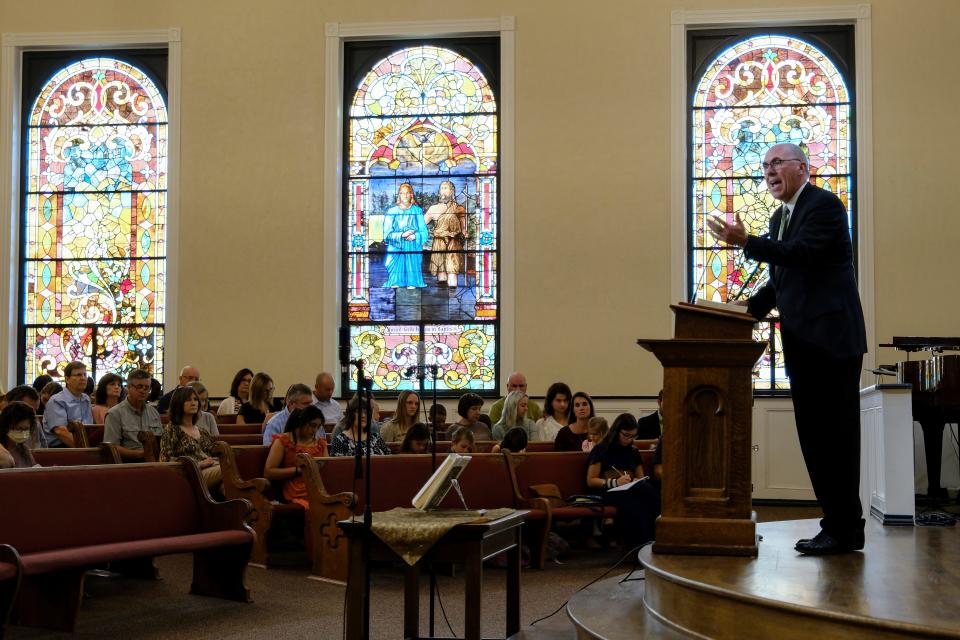
Barber’s academic interests and his emerging political commitments played off each other. Conservative Resurgence leaders were championing the same ideals he was studying, such as religious liberty and local church autonomy.
“He (Barber) is not a legalist. He’s driven by principle, rather than law,” Yarnell said. “The principle of democratic congregationalism and doing things in order and in a kind way is who Bart is.”
Barber went from being just a pupil of those ideals to a purveyor with the emergence of Baptist blogging.
A self-described “techy” who knows four coding languages, Barber started a blog in 2006 with low expectations and a cool name: Praisegod Barebones. But that changed quickly as Baptist blogging increasingly influenced SBC politics.
“I started pretty regularly writing stuff, almost all of which was a point to be scored against somebody else’s point,” Barber said.
Specifically, his blog emerged as an antithesis to Oklahoma pastor Wade Burleson, who ran one of the most popular Baptist blogs in a crusade against legalism and Southern Baptist leaders misusing their authority.
“My friends today were my enemies 15 years ago,” Burleson, who’s now retired from the pastorate, said in an interview. “Bart Barber was my enemy 15 years ago because he thought I was a progressive.”
Burleson once supported Patterson and the Conservative Resurgence, but eventually became a vocal critic of the movement and its leaders. Barber took it upon himself to fight back, writing posts such as “Keeping Watch over the Establishment” in 2007 and “Why I love Dr. Paige Patterson” in 2008.
“Among those who have blogged in defense of Dr. Patterson against these attacks, I know of few who have labored harder than I have,” Barber said in a 2009 post.
To Barber, an attack against Conservative Resurgence leaders was an attack against the ideas the movement stood for. He and others like him became collectively known as the “Baptist Identity” bloggers.
“I very quickly handed out team jerseys to people, one side or the other,” Barber said. “Quick to decide these people are against these ideas.”
It played out in-person, too. Baptist Identity bloggers didn’t greet Burleson at SBC annual meetings, Burleson said. Burleson, meanwhile, publicly opposed Barber’s nomination to Southwestern’s board at the 2009 SBC annual meeting.
Barber felt it went too far, he said in an interview. “The tone of my blogging increased partisanship and decreased cooperation in the Southern Baptist Convention.”
Challenging his commitment to the cause
Barber’s commitment to the cause faced challenges when he joined Southwestern’s board and began working directly with those whom he lauded in his online posts.
“Bart had an awakening,” Burleson said. “I think he realized he had been fed a bill of goods.”
It happened incrementally and due to mounting controversies. Early examples were the stained-glass windows installed in Southwestern’s chapel honoring Conservative Resurgence leaders and a proposed retirement home for Patterson and his wife on the seminary’s campus.
Donors designated funds for those projects, but it was bad optics at a time the seminary was cutting employee benefits and laying off staff.
At first, Barber stood with Patterson. “I went on the board as someone who wanted to implement Paige Patterson’s vision for Southwestern Seminary,” he said.
One way he did that, like his blog, was protecting Patterson from criticism.
But Patterson didn’t ask Barber to defend him, nor did Patterson show much appreciation when Barber did. Barber grew disillusioned and felt concerned less for Patterson’s legacy and more for Southwestern’s reputation. “I was thinking I’m going to try to save the seminary by saving Paige Patterson,” he said.
Barber wanted Patterson’s eventual departure to happen with retirement, allowing him to leave on a positive note and avoid ugly conflict with the board.
That all changed with revelations about Patterson’s response to reports of rape on seminary grounds and a woman’s disclosure about domestic violence. In each of the three scenarios, Patterson responded with a seeming lack of compassion for the women reporting the abuse and showed deference to the accused.
At that point, there was no question in Barber’s mind. “It got to the point where I was going to save the seminary by firing Paige Patterson.”
Letting go of loyalty
Southwestern’s board tried to fire Patterson during a marathon 13-hour meeting in May 22-23, 2018, but were unable due to two holdouts. Barber was one of them.
Instead, the board decided in that meeting to change Patterson’s title to president emeritus and asked him to retire soon.
After that May meeting, Patterson and his attorney fought back, which Barber felt was “just plain insubordination.” Also, a Washington Post article detailed one of the instances in which Patterson dismissed a female seminarian who reported being raped.
At that point, “there were two things I knew that shaped my vote to terminate Paige Patterson,” Barber said. “One was that I knew two people who had voted against firing him in the May 22-23 meeting whose opinion had changed.”
“The other thing was I had seen him (Patterson) fire people for far less and without so much attention to process,” he added. So, the board reconvened on May 30 and unanimously voted to fire the president.
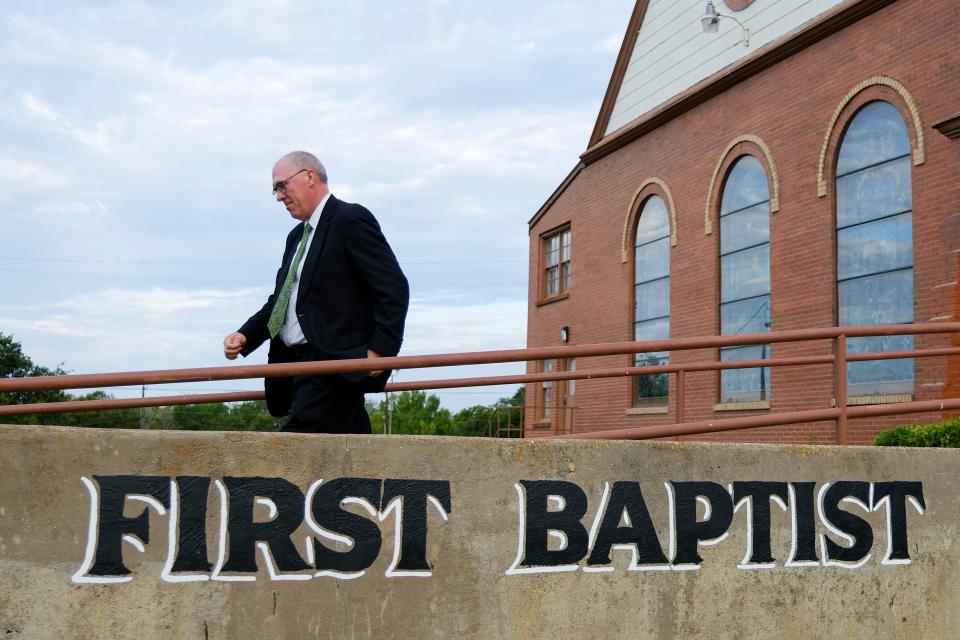
Patterson supporters retaliated swiftly. Donors penned a letter expressing disdain, while other allies devised a plan for the upcoming SBC annual meeting in Dallas to introduce a measure that sought to oust Southwestern trustees from the board.
Barber and his fellow trustees knew they needed to find someone to speak at the Dallas meeting in the board’s defense. But those fellow trustees, nor other well-respected Southern Baptist leaders whom Barber contacted, would volunteer.
With time running out, Barber took it upon himself. He hunkered down in the mezzanine of the Kay Bailey Hutchison Convention Center in Dallas and started writing.
“That was not something I wanted to do but it was something that needed to be done,” Barber said in an interview.
When he delivered the speech, he looked uncomfortable at first. He mostly looked down at his prepared remarks as he described Patterson’s leadership issues. But his countenance changed when he pivoted to talking about accountability and democracy in the SBC — topics he presented with authoritative enthusiasm and an intent gaze on the audience.
Barber’s two sisters watched the live stream. “We wept for him,” sister Traci Smith said in an interview. “Because we knew this was a moment where he had to choose if he was going to do the thing that honored God or honored a person.”
Minimizing hurt, cultivating health
Five years after that Dallas meeting, Barber found himself yet again preparing another consequential speech with fewer than 48 hours to spare.
This time, it was his presidential address for this year’s SBC annual meeting in New Orleans and he was writing about his mom, who had died that morning. It wasn’t a hard speech to write or deliver.
News of his mom’s death, though sorrowful, was also a source of stability for Barber that week. His mom’s passing meant an end to her suffering after a 20-year battle with Alzheimer’s.
Barber had been in Texas the week prior with his three siblings to care for her while he also prepared for the SBC. He left for New Orleans on Thursday, just a few days before his mom died.
“If our mother could have spoken at that point, she would have said to Bart, ‘Go,’” Smith said. “For Bart, that made going (to the SBC) honoring to her.”
The SBC annual meeting was contentious and emotionally charged, yet Barber felt grounded.
“It ratcheted down the sense of how consequential the things I was doing there,” Barber said in an interview. “I probably would have had quite a bit of anxiety and instead, my memory of that week is just a sense of calm and stability.”
It’s emblematic of his larger goals as SBC president, to lower the temperature of debate and promote compromise.
Some feel he’s already done that, for example, with the divide between megachurches versus small, rural congregations. The disproportionate number of megachurch pastors in SBC leadership has caused small-town pastors to feel underrepresented. Barber’s job as a small-town pastor has challenged that, Smith and Yarnell said.
For others, Barber’s messaging has its limits.
“Barber is good at talking the talk on abuse reform,” said Christa Brown, an abuse survivor and longtime advocate for reform, in a statement. “But I don’t see much difference in terms of walking the walk.”
As president, Barber appoints the SBC Abuse Reform Implementation Task Force, which is starting its second year of work. After dealing with some turnover and the appointment of a new chair, the task force is still working on projects that many expected to be complete by now.
“No matter how sincerely spoken, empty promises without substantive actions further wound survivors,” Brown said.
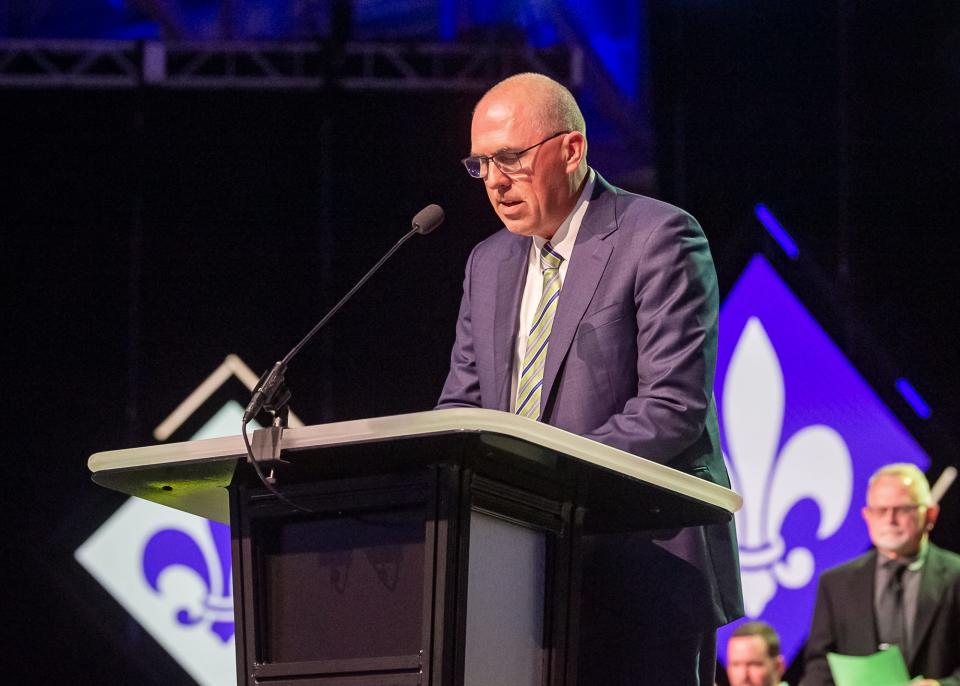
Barber agrees he has his work cut out for him.
A new SBC Cooperation Group that Barber recently appointed has until June to find a compromise that convinces the SBC not to ratify a measure that would enshrine a ban on women pastors.
Among the supporters of that measure and who want to see the SBC Cooperation Group fail are people who Barber once fought alongside.
“I had done some things that contributed to the SBC being less healthy,” Barber said. “And feel I have some obligation to make the SBC healthier as a sort of penance.”
Liam Adams covers religion for The Tennessean. Reach him at ladams@tennessean.com or on Twitter @liamsadams.
This article originally appeared on Nashville Tennessean: SBC president Bart Barber defied key leaders shaped his leadership

